The cross as the focus of longing
John Colvin
A TIMELESS PASSION by Naim Attallah Quartet, £10, pp. 146 Naim Attallah is that rare bird in English skies, a Roman Catholic Arab from Palestine. He has managed Asprey plc for many years, but his contribution to English letters — both direct and indirect — has also been substantial, including penetrating interviews with the great in the 'Certain Age' series, from Quartet, his own publish- er.
A Timeless Passion is his first novel. It concerns Carlo, an Anglo-Italian, rich and successful, married to an English woman whom he loves and reveres, settled in his life. Carlo travels from London to the Mezzogiorno to attend the funeral of his beloved mother.
The baroque story that ensues is shaped by the Stations of the Cross, beginning with a psychic fusion between a beautiful anthropologist, Petra, glimpsed in the fami- ly church, and a painting there of the Madonna. ('He has fallen' and 'He has received his Cross'). In grief, Carlo won- ders, however, whether Christianity is not entirely subjective, dependent only on the authority donated by the practice of its adherents. But in the hot sunlight, after the funeral, he knows that 'he has met his mother for the last time': everything was finished. 'He must bear his cross'.
A love affair explodes between himself and Petra, its physical details described in terms unthinkable 30 years ago and, even today, bringing a blush to this reader's cheek. Carlo, nevertheless,
feels no remorse; clear in purpose; raised above everyday living; closer to God; each blade of grass lit with Keatsian beauty . . . Petra is his link with the past, the innocence of his childhood, the essence of his homeland . . . his former life, the solace of religion, his alter ego.
The categorical imperative — what man ought to do — as well as the need to survive, drives him, through the concepts of dignity and goodness, to reconcile the seemingly irreconcilable, to create the future as a sunlit place, in which can coexist wife, children and lover. His solution is to propose a child to Petra, its provenance known only to them both, to sanctify and celebrate their love.
She, married too, but childless, refuses, regarding their love as myth, fantasy and a passionate chaos which Carlo, in particular, could not survive. Her refusal becomes 'his crucifixion', a desolation comparable to the white ants' unrelieved darkness or that creature's single, lethal flight, attributes earlier expounded by Petra. Carlo moves within a landscape whose only point of reference is his own well-being. He recalls the maxim of his teacher, Sister Ignatia:
The perpetual play of good and evil is enacted on the human stage through the experience of Death, Suffering, Sin and Grace.
Death and Suffering, the death of his mother and the loss of Petra, were clear. Sin and Grace were less so for, if it were a sin to love Petra, that passion had brought him closer to God.
Carlo leaves for England. 'He is taken down from the Cross'. The image of Petra fades, is gone. 'He is buried'.
But in Naples, within Petra, there is the 'first flutter of life like a crocus pushing through the snow'.
'State-of-the-art Chinese lap-top!'


































































 Previous page
Previous page